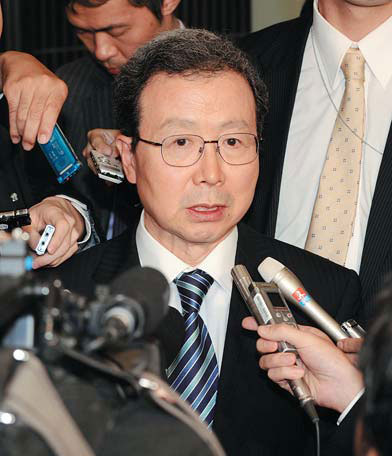Beijing rejects air defense zone accusations
Military expert: Tokyo 'exercising double standards'
A senior Chinese diplomat lodged a complaint with the Japanese ambassador in Beijing on Monday, following Tokyo's criticism of China's first air defense identification zone, which was announced over the weekend.
Assistant Foreign Minister Zheng Zeguang summoned Japanese Ambassador Kitera Masato to lodge the complaint and urged Japan to stop making groundless accusations.
Speaking at a news conference on Monday, Foreign Ministry spokesman Qin Gang rejected Japan's criticisms that China's East China Sea Air Defense Identification Zone was a "dangerous" move.
The establishment of the zone is "totally in line with the UN Charter and other international laws and practices, and thus is fully justified," Qin said.
On Saturday, China announced the range of the zone, presented a diagram of it and issued related aircraft identification rules.
At a parliamentary session on Monday, Japanese Prime Minister Shinzo Abe called it "unenforceable and dangerous".
Japan's criticisms are unreasonable, while Tokyo and the Japanese media are misleading the public, according to analysts in China.
"Japan already established its own air defense identification zone in the late 1960s, it has no right to make irresponsible remarks on China's establishment of such a zone," said Zhang Junshe, a Chinese military expert.
"Japan is exercising double standards in setting up such zones. This dictatorial logic will definitely be rejected by China," Zhang said.
Meng Xiangqing, another Chinese military expert, said, "Japan's government and media are conducting publicity stunts to fuel the 'Chinese military threat theory'."
Since Abe took office, it has become clear that Tokyo is seeking to change its status as a nation defeated in World War II. So it needs to create an atmosphere of a supposed Chinese military threat, he said.
Japan established its air defense identification zone back in 1969, and later expanded the zone several times, including three-quarters of the airspace over the East China Sea.
Japan's air defense identification zone is located only 130 km from the Chinese mainland at its closest point. They have been conducting surveillance on Chinese flights for a long time, Meng said.
"It is Japan that is performing 'dangerous' actions in the region," he added.
China's air defense identification zone overlaps with Japan's and covers China's Diaoyu Islands.
On Monday, Tokyo called in Chinese Ambassador Cheng Yonghua to demand that the plan be reversed, reported The Associated Press, but Cheng rejected the demand and asked Tokyo to retract its "unreasonable demand".
Qin, the ministry spokesman, reiterated on Monday that the Diaoyu Islands are an integral part of China's territory, and Beijing is firm in its resolve to safeguard sovereignty over them.
Ministry of National Defense spokesman Yang Yujun also rejected Japan's criticism on Monday, saying Japan's remarks are "utterly groundless and that China won't accept them".
He urged Tokyo to stop all moves that undermine China's territorial sovereignty as well as irresponsible remarks that misguide international opinion and create regional tensions.
According to Yang, Japan has frequently sent military planes in recent years to track and monitor Chinese military planes conducting normal exercises and patrols above the East China Sea, and has done so in the name of patrolling its own air defense identification zone.
Such activity severely undermined the freedom of over-flight and increased the likelihood of safety accidents and unexpected incidents, he said.
zhouwa@chinadaily.com.cn
|
Cheng Yonghua, Chinese ambassador to Japan, speaks to the media following his meeting with Japanese Deputy Foreign Minister Akitaka Saiki in Tokyo on Monday. Cheng was summoned to the Foreign Ministry to hear a protest at Beijing's declaration of an air defense identification zone, but he rejected the demand and asked Tokyo to retract its "unreasonable demand". Toshifumi Kitamura / Agence France-Presse |
(China Daily 11/26/2013 page10)















